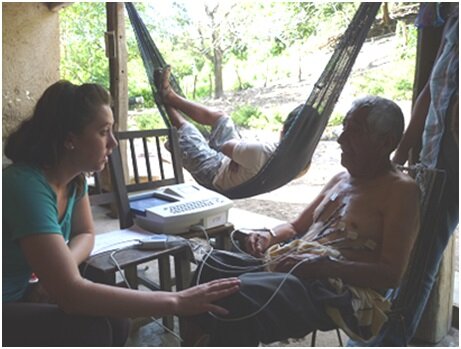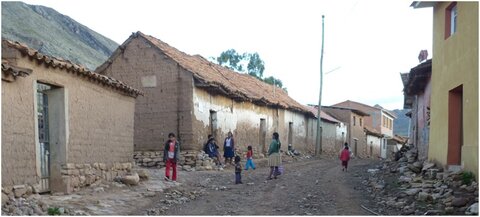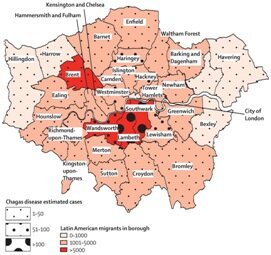The Chagas Hub: Tackling Chagas disease in the United Kingdom

April 14th marked World Chagas Day, an awareness day for a neglected tropical disease that is endemic across most of Latin America. As awareness raising days go it's not one which registers highly in the UK. But as the evidence grows for the disease's global spread and its potential impact on over a thousand Londoners, a new initiative led by LCNTDR members from LSHTM and Imperial College London is bringing together healthcare professionals and London's Latin American communities to tackle this disease. Imperial College's Daniela Kirwan explains why this is necessary.
Chagas disease is caused by the protozoan parasite Trypanosoma cruzi, which is delivered to its host by bugs called triatomines. These bugs are nocturnal, and bite their sleeping victims near the eyes or mouth where they can swell to the size of grapes as they feed. This causes the bugs to defecate and leave the parasite behind to make its way into the host’s bloodstream.
People can also contract Chagas disease through infected blood transfusions, by eating food contaminated by the bugs, or by mother-to-child transmission during pregnancy. Globally, over six million people have Chagas disease, but less than one percent have been diagnosed or treated.
Chagas disease kills over 7,000 people a year, but it is very much a hidden disease. After an initial infection phase, whichoften goes unnoticed, the parasites can remain within the person’s heart and digestive muscles for many years. Without treatment infection is lifelong. Most people don't realise they have the infection and may only become unwell decades after contracting the parasite. At this stage the person may develop cardiac complications such as rhythm disturbances and heart failure, and sudden cardiac death is the leading cause of death in patients with Chagas disease. Chronic gastrointestinal manifestations including severe dilatation of the oesophagus or colon can also occur.
Although treatment is available, this is most effective during the earlier stages of infection; once chronic manifestations are established it becomes much harder to treat. Active management of cardiac disease including pacemaker implantation can be life-saving but is difficult and costly. For this reason, establishing a diagnosis is important.

A spreading global health concern
Chagas disease is endemic throughout most of Latin America. The disease largely affects the rural poor, with the bugs finding favourable conditions in the walls and roofs of the traditional adobe and thatch houses in close proximity to livestock. The main approach to combating the disease has been programmes focusing on controlling the insect vector. A concerted effort led by WHO in Latin America has had substantial success, with estimated global prevalence of Chagas declining from 18 million in 1991 to 5.7 million in 2010.
However, the epidemiology of the disease is rapidly shifting. Increased migration from rural areas to cities in Latin America and the wider world has taken individuals silently infected with the parasite to new settings. This poses a public health threat, which is emerging in regions where neither the populations at risk nor the healthcare profession have much knowledge or understanding of the disease or its implications.
Chagas disease has been named the most important parasitic disease in the Western Hemisphere with an estimated disease burden 7.5 times that of malaria.
In London, the Latin American community accounts for an estimated 95,000 people from the 21 Chagas endemic countries, not including undocumented migrants or those born here to Latin American mothers. Although comparable in size to other migrant groups, the Latin American community has long beenneglected, as was highlighted by the 2011 commissioned report “No Longer Invisible”. This report found that the population are largely young and well-educated; although the majority (85%) were employed,their wages were lower than average; access to and use of healthcare services was poor; and many perceived discrimination to be a major barrier to improving their quality of life.

Chagas disease in London
To estimate the scale of the problem in London a team from LSHTM and ISGlobal conducted a modelling exercise drawing on the available data from Latin America and the UK. The findings from this model showed that we would expect at least 1,200 people in London to be infected with Chagas disease. However, only 41 cases were reported between 2001 and 2014, meaning thatover 96% of affected individuals remain undiagnosed.
Screening asymptomatic Latin American adults living in Europe has been shown to be a cost-effective strategy, and elsewhere in Europe such as in Spain, a more natural destination country for Latin Americans, clinical services are well established.

Introducing the Chagas Hub
Given the potential scale and impact of this disease on London's Latin American community services, a new initiative has been launched to promote strengthen screening and treatment services in the UK.
The Chagas Hub is a new and exciting collaboration bringing together healthcare professionals, researchers, advocates, and members of the Latin American community to tackle Chagas disease in the UK. We aim to address the lack of awareness about Chagas’ disease among the Latin American community in London and those working with them.
We will have three main streams of activity:
- Improve clinical services for those with, or at risk of, Chagas disease and other conditions that are prevalent in Latin America. The Hospital for Tropical Diseases already provides diagnostic and treatment services. We are in the process of expanding these services, including a dedicated Chagas clinic, and of increasing awareness of our availability among primary care, community, and obstetrics services throughout London. Details of how clinicians can refer patients for testing or management can be found here.
- Conduct research into the epidemiology and clinical manifestations of Chagas disease in London.
- Raise awareness of Chagas disease amongst London's Latin American community through public engagement activities. A range of community engagement activities will be held to raise awareness about the disease, reduce stigma and fear, and inform them about treatment options. We hope that this will have a direct impact on Latin Americans at risk of Chagas disease in the UK and perhaps even among their communities back home.
Our hope is that by the next World Chagas Day, most people in London who are at risk of this disease will know how to access the screening and treatment they need.
If you wish to get involved in the Chagas Hub, please email: david [dot] moore [at] lshtm [dot] ac [dot] uk
Further Chagas Reading
- Prevalence of Chagas disease in Latin-American migrants living in Europe: a systematic review and meta-analysis.
- Addressing the neglect: Chagas disease in London, UK
- Chagas disease among pregnant Latin American women in the United Kingdom: time for action
- Cost-effectiveness of Chagas disease screening in Latin American migrants at primary health-care centres in Europe: a Markov model analysis
- Decreasing the Impact of Chagas Disease Through Modelling
- Biological factors that impinge on Chagas disease drug development
- Increased mortality attributed to Chagas disease: a systematic review and meta-analysis
- Putting Infection Dynamics at the Heart of Chagas Disease